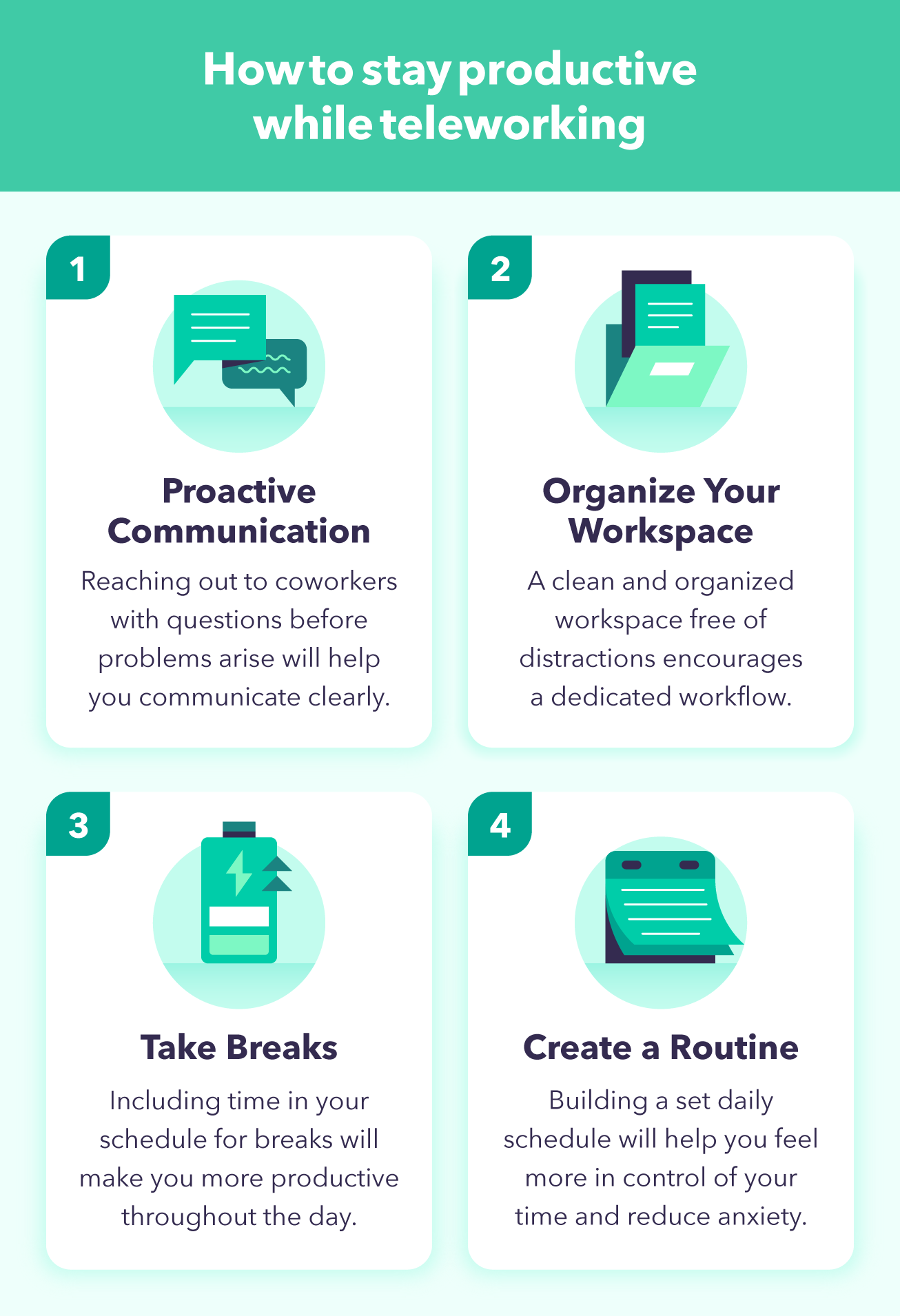
Pros and Cons of Working From Home: Is It Better for You and Your Wallet?
[ad_1]
Remote work became the new normal for many employees given the COVID-19 pandemic, but as many slowly return to the office, you may be considering whether or not working from home is best for your future. There are seemingly endless reasons to work from home, like the lack of a commute to decreased spending on childcare. However, remote work has its costs too, whether money comes out of your salary for a new ergonomic desk setup or you’re shouldering a more expensive utility bill.
We surveyed 1,006 workers to see their opinions on whether employers should cover remote work costs and found that approximately 70 percent agreed that employers should cover some or all of the costs associated with working from home. See the breakdown of results below:
- 37.5% agreed employers should cover all remote work expenses
- 32.8% believed a partial budget should be provided for remote work expenses
- 29.7% said that employers shouldn’t pay for remote work expenses
Regardless of what your work model looks like, there are several pros and cons to working from home. Read on to evaluate whether the benefits outweigh the costs for you and your career or jump to our infographic.
Contents
Does Working From Home Save You Money?
Working from home allows you to pocket the money you would spend on transportation, child or pet care, and work expenses like wardrobe or parking. Transportation is one of the most expensive parts of in-person work — Americans can spend up to $5,000 on transportation each year.
Another opportunity to save money with remote work is that you’re less inclined to spend money on coffee, lunch, and other food-related expenses with coworkers. Commuting can also impact how willing you are to cook since more of your energy will be expended via transportation.
The Pros of Working From Home
As we briefly mentioned above, there are several benefits to remote work that can save you money and increase your productivity. So much so that many remote employees want to keep it that way; in fact, 65 percent of remote workers surveyed said they wanted to remain remote. Luckily, the pandemic has increased the amount of work-from-home remote jobs on the market. Below, we listed some of the benefits of working from home and why it’s definitely worth considering.
1. Save Gas Money
One of the most common costs when it comes to transportation is gasoline since commuters can travel from far and wide to get to work. The average commuter can travel between 5 and 13 miles each way to get to work, which requires frequent trips to the gas station.
Working from home allows you to save money on gas by reducing the amount of trips to the gas station and ultimately saving you hundreds of dollars in the process.
- Pro tip: If you live in a metropolitan area, chances are you can use a rideshare app or a short-term rental car service to get from place to place. This is another great way to save money instead of constantly refilling your gas tank.
2. Tax Break Eligibility
Remote employees, freelancers, and self-employed individuals are more likely to be eligible for tax breaks like a home office deduction or a depreciation of equipment deduction.
- Pro tip: Taxes can be complicated, so make sure you meet the criteria outlined by the IRS to avoid unnecessary fees or penalties.
3. Eating at Home
Working in an office can increase your likelihood of eating at restaurants or stopping by coffee shops around town. Over time, this can amount to thousands of dollars.
As we mentioned before, commuting can deplete energy levels to the point where commuters don’t have the energy to cook and, consequently, order out instead. Not only is eating at home cheaper, but it’s generally better for your overall health.
- Pro tip: Meal order programs like HelloFresh ship your ingredients and recipes right to your door so you don’t have to worry about grocery shopping and finding what to eat.
4. Save on Clothing
In-person work often requires a dress code that can range from business casual to formal attire. Clothing items like suits, ties, dresses, and other work-appropriate items are required for certain professions and they can have a hefty price tag. This can also become increasingly expensive with dry cleaning and other laundry expenses.
Remote work still requires appropriate clothing and professionalism, but it drastically reduces the need for formal work attire. You can save hundreds of dollars on clothing and laundry services by working from home.
- Pro tip: Buying clothing items that can be worn for work and leisure are a great option for remote workers. Clothing items such as jumpsuits, polo shirts, and other business casual attire can help save you money in the long run.
5. Increased Productivity
Many remote workers in the past year reported increased productivity due to working from home. In a survey of remote teams, 65 percent of workers said they felt more productive at home than they did in the office.
- Pro tip: Setting limits on your phone for social media, games, and other activities can help you stay focused while working from home. You can also turn off notifications during the workday to stay productive and keep focused.
6. More Family Time
Long hours in the office can reduce the amount of time you’re able to spend at home with your loved ones, especially if you work night shifts or long days. Working from home allows for more quality time with family since you’re more likely to be in the same place at the same time.
- Pro tip: It’s important to make time for important people in your life. To do so, set boundaries and stick to a hard stop when your workday ends so that you can spend quality time with loved ones.
7. Environmentally Friendly
Commuting has an effect on the entire ecosystem we live in, given the pollution that comes from transportation. In fact, 29 percent of greenhouse gas emissions came from transportation alone in 2019. Most people don’t have electric cars, so exhaust and other car emissions contribute to the carbon footprint on Earth.
A daily 30-mile commute to work can result in hundreds of thousands of miles on your car and significantly impact the environment throughout your career. This makes a remote work environment a healthy option for you and the planet.
- Pro tip: To increase your positive impact on the environment, consider sustainable office furniture that is made from eco-friendly materials such as recycled wood, glass, and iron.
8. Increased Work-Life Balance
Working in-office full-time can fill up most of your day and leave you with little time to yourself after commuting. In-person work can also be so draining that by the time you do get home, you may not have the energy to meet friends and family.
Remote work can allow for more mental and physical energy, which ultimately improves your work-life balance and overall mental health.
- Pro tip: Burnout from remote work can also happen. Be sure to do the necessary self-care to conquer burnout such as therapy, meditation, yoga, and other acts of self-love.
9. More Schedule Flexibility
The typical 9-to-5 work shift takes up most of the day so it can be difficult to schedule appointments, attend your child’s events, or other important happenings in life. Working from home allows for more flexibility in your schedule where you can fit in important events and appointments without having to take time off.
- Pro tip: Once you’ve booked appointments or blocked off certain times on your schedule, make sure to let your coworkers or manager know not to schedule meetings at those times to avoid overlapping events.
10. Work From Anywhere
Many remote workers took the opportunity to work from anywhere, whether it be another country or a family member’s home. The flexibility of working remotely allows you to work in different locations, like a local coffee shop, for a change of scenery.
- Pro tip: If you do plan to work from a place other than your home, make sure the location has access to secure, high-speed internet for video conferencing and other work that requires you to be online.
The Cons of Working From Home
While there are plenty of advantages that come with remote working, it has also posed new challenges that we didn’t think about a year or so prior. Lack of movement, reduced social interaction, and other changes were some negative consequences of working from home. Below, we’ve listed some disadvantages of remote work to consider before making a decision.
1. Lack of Social Interaction
Communicating with managers and coworkers isn’t the same when conducted through a screen. Although video conferencing can help bridge the gap between social isolation and interaction, in-person interactions are few and far between when working from home.
- Pro tip: If you do decide to work from home, make sure you have scheduled outings with family and friends in-person to make up for interactions you can’t get from work alone.
2. Increased Likelihood of Overworking
Since working from home can take out in-office distraction, there is such a thing as being too focused on work. Overworking and burnout are common results of work-related stress that comes from remote work. Getting used to spending most of your day sitting in front of your computer is a hard habit to break.
- Pro tip: Overworking and burnout can be reduced by setting work-life boundaries like clocking on and off at certain times of the day. This ensures you aren’t working late into the night or starting so late that you’re forced to work later.
3. Distractions at Home
For some, working from home means peace and quiet as well as freedom from distractions. However, some remote workers may have children, dogs, and other things to cater to at home that can make remote work a lot more difficult.
- Pro tip: Should you choose to work from home, having set times where you request not to be disturbed can help decrease the number of distractions at home. You can even book a baby or dog sitter for important meetings or conferences to make sure you’re focused on the task at hand.
4. No Set Routine
In-person jobs require you to clock in and out at specific times, whereas remote workers can clock in and out with more flexibility. The lack of a set routine when working from home can result in an unpredictable schedule.
- Pro tip: Make sure you have a list of things you plan to accomplish for the day or a simple routine to follow to give yourself a sense of normalcy.
5. Increased Need for Self-Discipline
Similar to not having a set routine, remote work requires self-discipline given the independent nature of the work model. It’s your responsibility to make sure you’re not on social media for hours when you have a project that needs to get done.
- Pro tip: We mentioned in the pros section that increased productivity at home can be achieved through setting limits for social media and games on your phone. Another way to achieve self-discipline is creating a schedule for each day that you can hold yourself to.
6. Home Office Costs
Setting up your office at home requires space and materials that you may not have access to. This also means that your electricity bill might be higher if you work on a computer with multiple monitors. Although there are sometimes home office tax deductions, they’re not guaranteed for everyone.
- Pro tip: There are plenty of innovative ways to incorporate an office into your home, like the closet office. Make sure not to make your bedroom your office space if you can help it so you can maintain work-life boundaries.
Home office materials can be costly, especially if you need special technology like a computer or software. We conducted a survey to determine whether American workers felt that employers should cover the costs of working from home, and about 70 percent said employers should cover some or all remote-work related expenses.
7. Less Office Perks
Being in the office has its benefits: free lunch, access to the office gym, and other amenities that aren’t available to you if you work from home. There are also perks like office holiday celebrations or a simple chat with a coworker that make an in-person job more rewarding or enjoyable.
- Pro tip: Working at a company with a positive and engaging company culture can make remote work more enjoyable. If you have ideas on how to make your workplace more remote-friendly, try pitching them to human resources or a culture committee at your company.
Home office materials can be costly, especially if you need special technology like a computer or software. We conducted a survey to determine whether American workers felt that employers should cover the costs of working from home, and about 70 percent said employers should cover some or all remote-work related expenses.
8. More Effort in Changing Scenery
Although remote work allows you to work from virtually anywhere, it does take more effort to get out of your comfort zone. If you use your computer for work, you may not have access to a laptop to bring to a local cafe or coffee shop.
- Pro tip: If you don’t have access to a portable computer, see if your company has some to spare. A technology stipend may be in their best interest if they want increased employee satisfaction.
9. Telecommunication Difficulties
The increased telecommunication that became apparent during the pandemic was a challenge for many. Some may argue that it is more difficult to communicate via messaging platforms like Slack or email, so those who don’t prefer telecommunication may experience challenges.
- Pro tip: It might be in your best interest to communicate with a manager or coworkers that you prefer hopping on a video conferencing platform like Zoom or Skype to talk through projects and assignments.
10. Motivational Challenges
Having the motivation to succeed in your career goes hand in hand with self-discipline — it’s much more difficult to discipline yourself when you don’t have the motivation to. Especially for those who work remotely in the long term, it can be difficult to get up and do the same thing every day.
- Pro tip: While having a routine is important, make sure to mix up your workday. Try to start with different tasks or take breaks at different times to add variety and novelty to your schedule.
Deciding whether to work from home or in-person is a life-altering decision for which you must weigh the pros and cons. Remote work is not for everyone — introverts may thrive in remote work environments while extroverts struggle to get their needs met. Employees with children or noisy households might consider in-person work more advantageous, while independent young professionals may prefer the cost-effectiveness of remote work.
Regardless of your situation, there are plenty of telecommuting pros and cons to consider before making such a big decision. If you have the choice to work remotely or in-person, remember that no work model is perfect but each has its own advantages and disadvantages. Just know that whatever work environment you choose, you’re not alone.
Source: Investopedia
Related
[ad_2]










